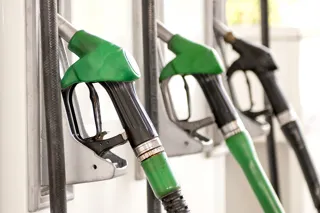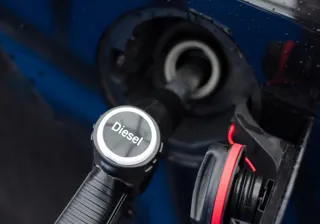Greater transparency in pricing is needed to improve consumer confidence and bring down prices for drivers, the Competition and Markets Authority (CMA) has concluded.
Following a year-long investigation into the road fuel market, the CMA has found there was no evidence to suggest cartel behaviour and it has no plans to open an enforcement case.
However, it found that from 2019-22, average annual supermarket margins have increased by 6 pence per litre (ppl), while increased margins on diesel across all retailers, cost drivers an extra 13ppl from January to the end of May, this year.
It also found that motorway service stations are charging around 20ppl more for petrol and 15ppl more for diesel compared to other fuel stations.
The price premium at motorway service stations has grown in real terms since 2012, and price variation on motorways is low, due to limited competition between service stations, it said.
Supermarkets are generally the cheapest places to buy fuel, with Asda typically the cheapest of those. This has anchored prices in the past, explained the CMA.
However, its investigation found that in 2022, Asda and Morrisons each made the decision to target higher margins.
Asda’s fuel margin target in 2023 was more than three times what it had been for 2019, while Morrisons doubled their margin target over the same period.
Other retailers, including Sainsbury’s and Tesco, did not respond in the way you would expect in a competitive market and instead raised their prices in line with these changes, said the CMA.
Taken together, this indicates that competition has weakened and reinforces the need for action, it added.
"Drivers appear to have lost out to the tune of nearly £1bn as a result of increased retailer margins," Simon Williams, RAC
Diesel prices have been slow to drop in 2023, which the CMA said was partially down to Asda ‘feathering’ (reducing pump prices more slowly as wholesale prices fell) its prices and other firms not responding competitively to that.
As a result, the CMA estimates that drivers have paid 13ppl more for diesel from January 2023 to the end of May 2023 than if margins had been at their historic average.
Sarah Cardell, chief executive of the CMA, said: “Competition at the pump is not working as well as it should be and something needs to change swiftly to address this.
“Drivers buying fuel at supermarkets in 2022 have paid around 6 pence per litre more than they would have done otherwise, due to the four major supermarkets increasing their margins.
“This will have had a greater impact on vulnerable people, particularly those in areas with less choice of fuel stations.
“We need to reignite competition among fuel retailers and that means two things.
“It needs to be easier for drivers to compare up to date prices so retailers have to compete harder for their business.
“This is why we are recommending the UK government legislate for a new fuel finder scheme which would make it compulsory for retailers to make their prices available in real time.
“This would end the need to drive round and look at the prices displayed on the forecourt and would ideally enable live price data on satnavs and map apps.”
She continued: “Given the importance of this market to millions of people across the UK this needs to be backed by a new fuel monitor function that will hold the industry to account.
“As we transition to net zero, the case for ongoing monitoring of this critical market will grow even stronger, so we stand ready to work with the UK government to implement these proposals as quickly as possible.”
A 'landmark day' for fuel prices

RAC fuel spokesman Simon Williams said: “This is a landmark day when it comes to fuel prices in the UK.
“The fact that drivers appear to have lost out to the tune of nearly £1bn as a result of increased retailer margins on fuel is nothing short of astounding in a cost-of-living crisis and confirms what we’ve been saying for many years that supermarkets haven’t been treating drivers fairly at the pumps.
“It’s all about action now and we very much hope the Government follows through with both of the CMA’s recommendation.
“While forcing retailers to publish pump prices is a positive step for drivers, what’s of far more significance is the creation of a fuel monitor function within government which, we very much hope, actively monitors wholesale prices to ensure forecourts don’t overcharge when the cost they pay to buy fuel drops. Without this, we fear drivers will continue to get a raw deal.”
The CMA also found that local factors also contribute to how much drivers pay at the pump.
The CMA identified that there are significant price differences in local areas, and that the difference between the highest and lowest prices in local areas has increased as average fuel prices have risen.
Lower prices are typically associated with having a supermarket retailer nearby, and where there are no supermarkets, for example, in remote areas, fuel retailers are likely to have higher costs and prices are likely to be higher, it found.
The fuel finder scheme will be important to help people find the best deal possible, but it is essential that the monitoring function keeps a close eye on local variations in prices, says the CMA.
A fuel finder scheme, the CMA argues, would allow drivers an easy way to see where they can find cheaper fuel in the area if they come off the motorway.
“Data we shared with the CMA shows there have been several instances of ‘rocket and feather pricing’ when the cost of wholesale petrol and diesel fell but it took an inordinate amount of time for supermarket pump prices to reflect this,” said Williams.
“And on several occasions, they didn’t ever fully cut pump prices to reflect just how far the wholesale market had dropped.
“This is even the case today with diesel prices as for more than three months the cost of buying diesel on the wholesale market has been less than petrol, yet it remains the case that drivers are still having to pay more for diesel than unleaded at the pumps.
“At one point the average margin charged on diesel was 25p a litre which is more than three times the long-term margin of 7p. This shouldn’t be allowed to happen, particularly when the Treasury has reduced duty by 5p a litre to help households struggling with the cost-of-living crisis.”
The CMA has also imposed fines totalling £60,000 on Asda for failing to provide relevant information in a timely manner.
Asda received two fines, each of £30,000 (the statutory maximum), for sending a representative to attend a compulsory CMA interview who was not equipped to provide evidence on certain topics the CMA had identified in advance; and failing to respond completely to a compulsory written request for information.
Asda has now provided the CMA with the required information.
The final report on the Road Fuel Market Study is available to read in full.























Login to comment
Comments
No comments have been made yet.